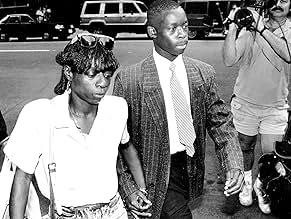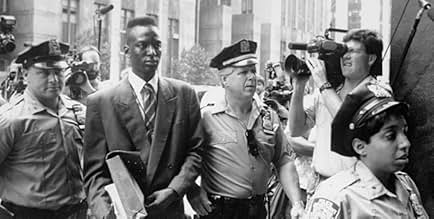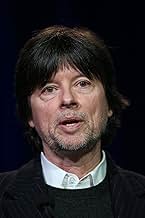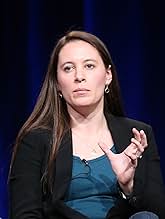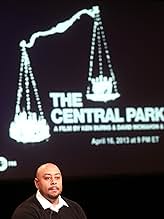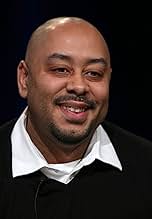IMDb RATING
7.7/10
8.2K
YOUR RATING
A documentary that examines the 1989 case of five black and Latino teenagers who were convicted of raping a white woman in Central Park. After having spent between 6 and 13 years each in pri... Read allA documentary that examines the 1989 case of five black and Latino teenagers who were convicted of raping a white woman in Central Park. After having spent between 6 and 13 years each in prison, a serial rapist confessed to the crime.A documentary that examines the 1989 case of five black and Latino teenagers who were convicted of raping a white woman in Central Park. After having spent between 6 and 13 years each in prison, a serial rapist confessed to the crime.
- Directors
- Writers
- Stars
- Awards
- 10 wins & 18 nominations total
Kharey Wise
- Self - Wrongfully Convicted
- (as Korey Wise)
Matias Reyes
- Self - Confessed Rapist
- (archive footage)
- (archive sound)
Calvin O. Butts III
- Self - Reverend
- (as Rev. Calvin Butts)
- Directors
- Writers
- All cast & crew
- Production, box office & more at IMDbPro
Featured reviews
As someone who remembers this case well, it's pretty sobering to be faced with these five men 23 years after the fact recounting their version of events that occurred when they were teens and hard not to feel sorry for them. Worse, one can't help but wonder how such a miscarriage of justice could have happened with everybody watching. All I can think is that these boys were handy scapegoats for a decade of out-of-control crime and violence in New York and they became sacrificial lambs. Somebody had to pay the price. These five just happened to be in the wrong place at the wrong time, admittedly doing the wrong thing (running with a mob of teens committing random attacks on white joggers and bicyclists), and the cops needed convenient suspects who were young and vulnerable enough to be manipulated into confessing to the most serious crime that occurred that night. Their convictions and a handful of other high-profile incidents during the Dinkins administration paved the way for the election of Rudolph Giuliani as mayor and a new era of proactive law enforcement and a relentless stop-and-frisk campaign aimed at black and Latino men in the city's poorer communities.
Does the film make its case without flaws? No. The deck is too stacked. They should have allowed some representative of the police or D.A.'s office to explain themselves. Michael F. Armstrong, counsel for the NYPD, says he spent half-a-day being interviewed on camera for the film and was then not included in the final cut. Some attention should have been given to what these five boys were doing in the park that night and what other crimes they themselves might have been implicated in. Yes, they describe some acts they saw being committed by other boys and either outright deny their involvement or couch it in vague terms. I think it would have been good to know if the police had direct evidence of these boys' participation in other crimes that night. For one thing, it would mean these kids might not have been the saints they're made out to be, which of course doesn't justify false accusations and wrongful convictions, as the most vocal critics of this film seem to think, but it means recognizing a significant gray area here. If they actually did participate in the mob violence that night, some attention might have been usefully paid to the whole issue of how seemingly otherwise good kids from poor but stable homes with fathers present in their lives can get caught up in that kind of lawlessness.
Also, more importantly, they should have had some expert on hand to address the whole phenomenon of false or coerced confessions and give their objective assessment of this particular case and perhaps give other known examples of established false confessions, just to provide some context and answer those critics who stand by the notion of absolute guilt based on confession. It's touched on in a couple of the interviews, but not by a recognized expert on the issue and not in any depth.
Still, it's a powerful piece and has far fewer Ken Burns-style gimmicks than we see in his other films. He manages to stay out of his own way for much of the time and let the interview subjects have their say. Maybe that's a result of having directorial collaborators.
Does the film make its case without flaws? No. The deck is too stacked. They should have allowed some representative of the police or D.A.'s office to explain themselves. Michael F. Armstrong, counsel for the NYPD, says he spent half-a-day being interviewed on camera for the film and was then not included in the final cut. Some attention should have been given to what these five boys were doing in the park that night and what other crimes they themselves might have been implicated in. Yes, they describe some acts they saw being committed by other boys and either outright deny their involvement or couch it in vague terms. I think it would have been good to know if the police had direct evidence of these boys' participation in other crimes that night. For one thing, it would mean these kids might not have been the saints they're made out to be, which of course doesn't justify false accusations and wrongful convictions, as the most vocal critics of this film seem to think, but it means recognizing a significant gray area here. If they actually did participate in the mob violence that night, some attention might have been usefully paid to the whole issue of how seemingly otherwise good kids from poor but stable homes with fathers present in their lives can get caught up in that kind of lawlessness.
Also, more importantly, they should have had some expert on hand to address the whole phenomenon of false or coerced confessions and give their objective assessment of this particular case and perhaps give other known examples of established false confessions, just to provide some context and answer those critics who stand by the notion of absolute guilt based on confession. It's touched on in a couple of the interviews, but not by a recognized expert on the issue and not in any depth.
Still, it's a powerful piece and has far fewer Ken Burns-style gimmicks than we see in his other films. He manages to stay out of his own way for much of the time and let the interview subjects have their say. Maybe that's a result of having directorial collaborators.
"Central Park Five" serves as a warning about legal incompetence, innocent lives destroyed, and a judicial system vulnerable to manipulation. The documentary details a nightmare scenario for five Harlem teenagers facing hard time, and the condemnation of America for a crime they didn't commit. The production sets the situation immediately, introducing the viewer to NYC in the 1980s, where Wall Street is in the process of rebuilding its reputation, while crack ravages the inner city, creating an explosive racial divide.
The film examines the infamous 1989 Central Park Jogger case, where a young white woman is brutally beaten and raped in New York's Central Park. At the same time, a group of five young black and Latino teenagers were quickly arrested for the crime and imprisoned. Following swift arrests by law enforcement officials, the prosecutors proudly declared the conviction as a step forward in the reclamation of a the city. Despite the lack of concrete evidence, all five are found guilty on multiple charges. Raymond Santana, Yusef Salaam, Antron McCray, Kevin Richardson, and Kharey Wise each spent between six to 13 years in prison, professing their innocence, while maintaining that it was a coerced confession to the crime. However, a chance encounter between the oldest of them and convicted serial rapist Matias Reyes, who years later yields his free admission of sole responsibility for the crime, and the claim is further substantiated with DNA evidence.
The documentary's approach seamlessly blends past and present, re-examines the assault, and walks you through what happened to the teenagers, from their arrest through their exoneration. Burns captures the complexity of history with startling results, yet "The Central Park Five" isn't quite as comprehensive as hoped, and fails to add anything substantively new to the story. Additionally, an element of balance is missing that would have turned a very good documentary into an exceptional one.
"The Central Park Five" presents the facts of the case with clarity, and it is a courageous, revealing look at the often complex and broken legal system in the United States. Unfortunately, there is no avoiding the conclusion presented by historian Craig Steven Wilder: "Rather than tying (the case) up in a bow and thinking that there was something we can take away from it, and that we'll be better people, I think what we really need to realize is that we're not very good people."
The film examines the infamous 1989 Central Park Jogger case, where a young white woman is brutally beaten and raped in New York's Central Park. At the same time, a group of five young black and Latino teenagers were quickly arrested for the crime and imprisoned. Following swift arrests by law enforcement officials, the prosecutors proudly declared the conviction as a step forward in the reclamation of a the city. Despite the lack of concrete evidence, all five are found guilty on multiple charges. Raymond Santana, Yusef Salaam, Antron McCray, Kevin Richardson, and Kharey Wise each spent between six to 13 years in prison, professing their innocence, while maintaining that it was a coerced confession to the crime. However, a chance encounter between the oldest of them and convicted serial rapist Matias Reyes, who years later yields his free admission of sole responsibility for the crime, and the claim is further substantiated with DNA evidence.
The documentary's approach seamlessly blends past and present, re-examines the assault, and walks you through what happened to the teenagers, from their arrest through their exoneration. Burns captures the complexity of history with startling results, yet "The Central Park Five" isn't quite as comprehensive as hoped, and fails to add anything substantively new to the story. Additionally, an element of balance is missing that would have turned a very good documentary into an exceptional one.
"The Central Park Five" presents the facts of the case with clarity, and it is a courageous, revealing look at the often complex and broken legal system in the United States. Unfortunately, there is no avoiding the conclusion presented by historian Craig Steven Wilder: "Rather than tying (the case) up in a bow and thinking that there was something we can take away from it, and that we'll be better people, I think what we really need to realize is that we're not very good people."
The documentary is well polished. And it proves the professionalism of the production team. But it is dull. And all the accents are missing. The whole film is something done to get cookie points from someone.
It starts with the populist statement about the rich of New York. The whole first part has no connection with the case. Just a "see, we're all for social justice" or something. In the end, the whole production is about not upsetting anyone. Yes, the case was badly handled. And there is racial polarization present in all footage. But the production team does not have the guts to say it it was about race. Also, not a word the whole movie about the leeches in the Police and DA. Only the last five minutes a mild talk, even more diluted with talk about "the press". How about when they had a positive identification of the DNA evidence and the bureaucrats become very scrupulous and started an investigation. Which meant more prison time for the victims and more money spent from the tax payer. There is only one slide about the civil suit brought by the Five against the governmental workers that handled the case. Nothing about the generous pension plans and impeccable record of the judge, district attorneys, policemen.
Nothing that could upset anyone while getting the most about being heroes talking about a 20 year old case. A perfect case of exploitation of somebody's pain for personal gain.
It starts with the populist statement about the rich of New York. The whole first part has no connection with the case. Just a "see, we're all for social justice" or something. In the end, the whole production is about not upsetting anyone. Yes, the case was badly handled. And there is racial polarization present in all footage. But the production team does not have the guts to say it it was about race. Also, not a word the whole movie about the leeches in the Police and DA. Only the last five minutes a mild talk, even more diluted with talk about "the press". How about when they had a positive identification of the DNA evidence and the bureaucrats become very scrupulous and started an investigation. Which meant more prison time for the victims and more money spent from the tax payer. There is only one slide about the civil suit brought by the Five against the governmental workers that handled the case. Nothing about the generous pension plans and impeccable record of the judge, district attorneys, policemen.
Nothing that could upset anyone while getting the most about being heroes talking about a 20 year old case. A perfect case of exploitation of somebody's pain for personal gain.
The Central Park Five (2012)
**** (out of 4)
Excellent documentary from Ken Burns, Sara Burns and David McMahon about the 1989 crime that shocked New York City. A white woman went jogging in Central Park where she would be severely beaten and raped. Five black teenagers were eventually charged with the crime with the only evidence being their own confessions, which were pretty much planted in them by the police. I was only vaguely familiar with this case and hadn't really heard about all the events that happened back when the crimes happened. With that said, it's pretty shocking to see these five were convicted of these crimes and it's pretty clear that the only reason they were prosecuted was the media attention and all the hatred that it stirred up among people. Yes, race was certainly a factor and it was also a factor that the crime happened in Central Park. As the film mentions, other crimes were being committed everywhere yet very little media attention happened. There's no question that the material was given to the right people as there's all sorts of great information given about the case, the trial and what would eventually clear the five people. If you're familiar with the work of Ken Burns then you know he always talks about the "other" situations around the subject. That happens here when they discuss the crime rates in NYC and how this played a part in the police needing to solve this crime even if they went after the wrong people. Another great aspect is that all five people are interviewed and hearing from them is certainly priceless. Sadly, those who cost them years of their lives were too big of cowards to appear on camera and what's even more shocking is that they still seem to think they did nothing wrong.
**** (out of 4)
Excellent documentary from Ken Burns, Sara Burns and David McMahon about the 1989 crime that shocked New York City. A white woman went jogging in Central Park where she would be severely beaten and raped. Five black teenagers were eventually charged with the crime with the only evidence being their own confessions, which were pretty much planted in them by the police. I was only vaguely familiar with this case and hadn't really heard about all the events that happened back when the crimes happened. With that said, it's pretty shocking to see these five were convicted of these crimes and it's pretty clear that the only reason they were prosecuted was the media attention and all the hatred that it stirred up among people. Yes, race was certainly a factor and it was also a factor that the crime happened in Central Park. As the film mentions, other crimes were being committed everywhere yet very little media attention happened. There's no question that the material was given to the right people as there's all sorts of great information given about the case, the trial and what would eventually clear the five people. If you're familiar with the work of Ken Burns then you know he always talks about the "other" situations around the subject. That happens here when they discuss the crime rates in NYC and how this played a part in the police needing to solve this crime even if they went after the wrong people. Another great aspect is that all five people are interviewed and hearing from them is certainly priceless. Sadly, those who cost them years of their lives were too big of cowards to appear on camera and what's even more shocking is that they still seem to think they did nothing wrong.
I was leery of this despite a friend's recommendation. I didn't live in NY at the time and basically ignored the news reports. So, this film I found fascinating, should be required for all law students and certainly worthwhile for everyone else. It could have been 5 or 10 minutes shorter but frankly I feel that way about most films. I had a bit of confusion sorting out the Five and their adult selves. (One of them changed to or from a Muslim-sounding name, I think). Also it's a very interesting portrait of NYC circa 1990. I'd like to know more about why the civil case is still "unresolved". The tone of the film is indignant but, more importantly, it is truth-seeking. That's why it's so compelling: we viewers want to find out what happened.
Did you know
- Quotes
[last lines]
Antron McCray: The truth came out. Truth came out.
- ConnectionsFeatured in Ken Burns: America's Storyteller (2017)
- SoundtracksYo Slippin
Written by KRS-One
Published by Universal Music - Z Tunes LLC
Performed by Boogie Down Productions
Courtesy of RCA Records
By arrangement with Sony Music Licensing
- How long is The Central Park Five?Powered by Alexa
Details
- Release date
- Country of origin
- Language
- Also known as
- Los cinco de Central Park
- Filming locations
- Production companies
- See more company credits at IMDbPro
Box office
- Gross US & Canada
- $325,653
- Opening weekend US & Canada
- $30,570
- Nov 25, 2012
- Gross worldwide
- $325,653
- Runtime1 hour 59 minutes
- Color
- Sound mix
- Aspect ratio
- 1.78 : 1
Contribute to this page
Suggest an edit or add missing content




